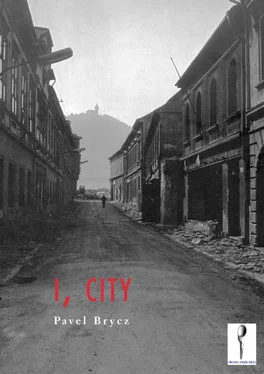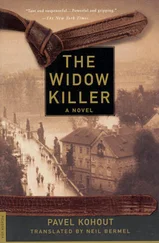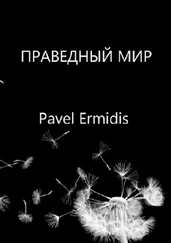Pavel Brycz - I, City
Здесь есть возможность читать онлайн «Pavel Brycz - I, City» весь текст электронной книги совершенно бесплатно (целиком полную версию без сокращений). В некоторых случаях можно слушать аудио, скачать через торрент в формате fb2 и присутствует краткое содержание. Год выпуска: 2006, Издательство: Twisted Spoon Press, Жанр: Современная проза, на английском языке. Описание произведения, (предисловие) а так же отзывы посетителей доступны на портале библиотеки ЛибКат.
- Название:I, City
- Автор:
- Издательство:Twisted Spoon Press
- Жанр:
- Год:2006
- ISBN:нет данных
- Рейтинг книги:5 / 5. Голосов: 1
-
Избранное:Добавить в избранное
- Отзывы:
-
Ваша оценка:
- 100
- 1
- 2
- 3
- 4
- 5
I, City: краткое содержание, описание и аннотация
Предлагаем к чтению аннотацию, описание, краткое содержание или предисловие (зависит от того, что написал сам автор книги «I, City»). Если вы не нашли необходимую информацию о книге — напишите в комментариях, мы постараемся отыскать её.
Dubliners
I, City
I, City — читать онлайн бесплатно полную книгу (весь текст) целиком
Ниже представлен текст книги, разбитый по страницам. Система сохранения места последней прочитанной страницы, позволяет с удобством читать онлайн бесплатно книгу «I, City», без необходимости каждый раз заново искать на чём Вы остановились. Поставьте закладку, и сможете в любой момент перейти на страницу, на которой закончили чтение.
Интервал:
Закладка:
And she screamed back to him, her mouth pursed out the window: “Andrea… Andrea Mattinelli! And you, Mr. Novák?!”
Mr. Novák stopped, giddily panting, and when he finally got his breath back, he roared his name after the disappearing bus throughout the entire bus station: “Josef… Josef Novák!”
And the old lady, dozing with her parcels on the occupied bench, woke up: “What’s going on? Why are you screaming?”
“I have to scream, Ma’am. Today I was reborn. You are entirely repulsive, but I’ll kiss you all the same. Today, you saved me from misery!”
And he kissed the old hag and for the whole night he stayed awake, drinking with me, city, the sweet coffee of night.
AN APPEARANCE, MILITARY
You ask how the Warsaw Pact could dissolve from one day to the next? Without the firing of a single shot and without the shedding of a single drop of blood?
I’ll try to explain it to you.
There is a house for dancing, whose floor plan forms the letter T. “T” like the trot the house was once built for. Trees grow in front of the house, poplars toward the heights, rowans toward the blood. A beautiful house on Podžatecká Street.
It used to be the Railwaymen’s Dancing Club in 1987, the year the military overlords inducted the recruitment classes born in 1967 and 1968.
And because the dancing didn’t make full use of the house throughout the day — during the day only the Krishnas, the Dervishes and the great ballet-master Vlastimil Harapes danced there — rolling army inductions for the Warsaw Pact took place here from an early hour.
The class of 1967. The class of 1968. Boys from the Gymnasium, technical college, vocational schools, crowded into the lavatory stalls with their sample cups and stood over the porcelain bowls. Unfortunates. They’ve stood for an hour already, fifty conscripts above the urinals. And nothing. And more and more of them coming. A hundred boys. A hundred-fifty. And nothing, still. They stand in confused silence above their empty cups.
They might have stood there until Judgment Day, trying to drink the water from the tap, thinking hard about their early childhoods and their potty-training, and trying somehow to coax their bladders into compliance, if He hadn’t come. Dezider Balogh.
A mining apprentice. A middle heavyweight boxer from Baník Most. Such a stud that he’d easily jump rope for an hour, box with his shadow for another hour and dance around the punching bag for yet another hour and a half, all without breaking a sweat. Not until he went to the sauna for two hours could he be seen with a wet forehead.
Such was Dezider Balogh, a middle heavyweight boxer, who in greeting offered his left, not that he was left-handed, but with his right he would crush your hand and cause incredible problems in the network of all those small bones, which enable you to play the piano, construct model airplanes or snap your fingers at a waitress. I tell you, I am a city of reinforced concrete, but I wouldn’t step into the ring with Dezider Balogh and his right.
And because Dezider was not scared of any competitor, he approached the bowl with the cup and filled both containers to the brim. One-hundred-eighty conscripts were astounded. Suddenly one of them, bold Mikoláš Smetana, had the idea to hand his container to Dezider.
And Dezider, who feared no rival, filled up the second cup, too. And that day he filled exactly one-hundred-eighty-three of them.
No one else in the world could manage that.
He simply stood, taking the cups from the inductees and passed urine to them. Bravo, Dezider! I applaud, full of admiration even today, after so many years.
The hundred-eighty-three young men remember him with gratitude, too.
That’s the whole story. I have nothing more to say. Dezider Balogh had bilirubin in his urine.
They didn’t draft him.
Such a sly pisser!
AN APPEARANCE, EMPTY
The house is empty — will we make love or cry? Where did I hear such a question?
Was it in the villa in the Zahražany district, or in that Márquez book, One Hundred Years of Solitude?
And yet it was heard from the villa in Zahražany.
Germans had lived there earlier. Roland from a photograph in a Wehrmacht uniform — a Christmas postcard home, he smiles in the photograph, ah yes, he’s still smiling; he doesn’t know he’s been dead such a long time.
Auntie Rachel knits mittens for the Eastern Front; she keeps records of packages sent to Russia, Winterhilfe … “today, I sent fifty pairs of gloves to…” the writing is still legible for those who know German, but no one reads it anymore. On the lone table in the middle of the otherwise empty room stands a framed portrait of a great man.
An old man with a white beard. He smiles. And yet he too is dead. His granddaughter gazes at the photograph and cries. If grandfather had lived, today he would have been one-hundred years old.
The granddaughter is a bit over twenty and she has brought her boyfriend to this forsaken house to make love. Now she cries.
“The beds were here, and there a chest of drawers, the commode… and pictures, dishes, cutlery… and my grandmother’s clock, who could have done that, who would have dared!” With tears in her eyes the girl looks around the plundered villa of her grandfather, the man from the portrait, who came after the war to revive the house.
“Gypsies!” the girl’s boyfriend announced.
He didn’t want to tell her that in the garden he’d found the hideous carcass of a dog the thieves had eaten. Flies sat on the dog’s skin. To banish those awful images, he looked again at the photograph of the old man. No, he couldn’t make love with the granddaughter of such a great man, not here. After all, he thinks, I don’t even reach up to his ankles.
“This is a real man! I felt like running away from this weird sickening world as soon as I saw those flies, but he’d survived the Gestapo and the end of the war and a life nearly a hundred years long! And these hoodlums, they didn’t even have the respect to leave him in peace.”
It doesn’t scare him as much that they stole things — pictures, jewelry, dressers — but that in doing so they stole the souls of strangers. They’d violated what was most private, what had remained of that white-haired old man, of Roland and Rachel.
They had brutally raped the house in Zahražany.
When will that question be heard again?
“Will we make love or cry?”
When will my night visitors, the young man and the young woman, lose their inhibitions and fear?
When will they become naked and merge in embrace, to fill the empty house in Zahražany with spirit?
I don’t know.
I don’t believe anything.
AN APPEARANCE, WALKING
If I haven’t told you about Till yet, about my son from Mozartova Street, then I have to set it right immediately. Because there was always something with this Till.
He was going on twenty-three and had yet to serve in the army. He downright avoided his service.
Fact is he liked to take leave every day. Whenever he wanted.
He just walked the city without a care in the world, looking at whatever he wanted to and either whistled or not.
And once, at Rozkvět, at the shop where Mr. Pivo always has his street show and juggles bottles for a beer — and don’t think Mr. Pivo’s a small beer, they know him even in Prague, where he used to guest on Národní třída, opposite the Máj department store — Till met a man who walked in a way that seemed as if he almost wasn’t able to walk at all: the man leaned against the glass of a shop window and seemed he wouldn’t get to wherever it was he was headed.
Читать дальшеИнтервал:
Закладка:
Похожие книги на «I, City»
Представляем Вашему вниманию похожие книги на «I, City» списком для выбора. Мы отобрали схожую по названию и смыслу литературу в надежде предоставить читателям больше вариантов отыскать новые, интересные, ещё непрочитанные произведения.
Обсуждение, отзывы о книге «I, City» и просто собственные мнения читателей. Оставьте ваши комментарии, напишите, что Вы думаете о произведении, его смысле или главных героях. Укажите что конкретно понравилось, а что нет, и почему Вы так считаете.












